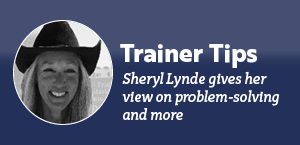 Have you ever felt you are at the limit of your knowledge when trying to resolve a behavioral issue or perhaps achieving a goal or target? You may not even know what you don’t know—you just feel stuck.
Have you ever felt you are at the limit of your knowledge when trying to resolve a behavioral issue or perhaps achieving a goal or target? You may not even know what you don’t know—you just feel stuck.
This is your starting point. Listen to your intuition. This is the time for honesty. As much as we take credit for our success, just as important is acknowledging and taking responsibility for our failures. You can’t blame the horse, the person who sold you your horse, your job, the limited amount of time or finances you have to spend on your hobby, etc. We are where we are based on decisions we have made or have allowed to be made for us.
The only thing that stops you from getting what you want in life is the story you tell yourself why you can’t have it.
You have to know three things: 1. where you are, 2. where you want to go and 3. how you are going to get there. If you really want to achieve a goal, be specific and have a measureable target.
The route you create from your starting point to your goal is your strategy. If you need help, choose a professional who has expertise in the skill you want to develop, whether it be colt-starting, dressage, problem-solving, cow horse, foundational training, etc. Determine how much you can spend and how much time you can devout toward achieving your goal. Whether it’s once a week or once a month, develop a plan and stick to it. Do not compare your progress to that of others—keep your focus on accomplishing, not comparing.
At the first stage of learning, you are unconsciously incompetent, as explained by Jordan Belfort, whose memoir was the basis for Martin Scorsese’s The Wolf of Wall Street.
As you begin any new endeavor, you are a complete novice. You start at the beginning. There are no shortcuts. There is limited anxiety because you don’t know what you don’t know. You are enthusiastic and fearless in your riding.
The second level is described as consciously incompetent.
You may have fallen off, suffered an injury or are experiencing issues that your horse is exhibiting that you don’t know how to safely handle. Fear starts to sink in, and you realize that you aren’t invincible and that there is more to riding than just hanging on to the reins. As you become better informed, the assumption that it was the sole fault of your horse is replaced by an awareness of the moment the issue materialized months ago and was left uncorrected. You become overwhelmed at everything there is to learn. In order for the horse to change, you have to change old thought patterns, physical habits and develop new riding skills.
The third level is consciously competent.
Here, you are making progress and have achieved a higher skill level. You become knowledgeable at making the corrections needed and your horse has made a noticeable change. You are consistent at achieving the results you are looking for and are developing timing and feel as a rider, however, it takes concentration. You can’t be distracted while practicing because you need to focus and muster the mental energy to perform the tasks when needed. You notice a difference in confidence and the satisfaction you feel in even the smallest of improvements because it’s another step forward toward your goal. You also realize that failures are inevitable. They teach us what not to repeat.
The fourth level is unconscious competence.
This is when you are really great at something, and you perform the task instinctually. You know what the horse is thinking and you can correct or reward the thought. You can read the cow and put your horse in the position he needs to be in. You are using your hands, seat and legs as constructive tools instead of inhibitors of the horse’s movements.
The only way to get from level one to level two is to increase your knowledge. This takes time, patience and the willingness to feel awkward at times. These moments will diminish as a new comfort zone is constructed.
The only way to move from level three to level four is by practice. You have to perform the maneuver again and again and again until it clicks and you begin to use the unconscious part of your brain which is more powerful than your conscious mind.
It takes a passion and a love for what you do to want to improve, to be all that you were created to be so that you can develop that knowledge into a service for others. If you do, the voice you hear is “What if I can pull this off!”
–Sheryl
Leave a Comment
All fields must be filled in to leave a message.